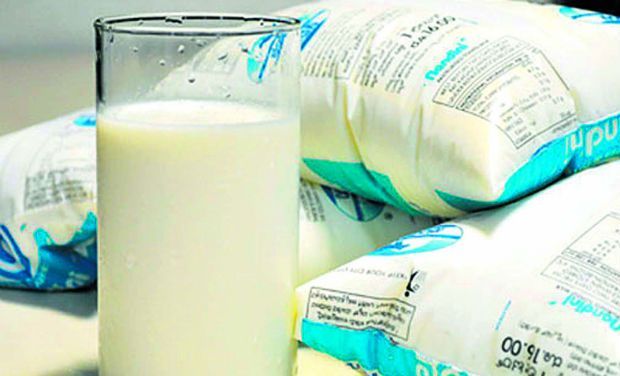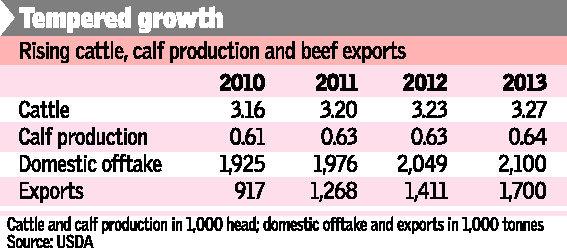Monthly Archives: September 2013
Dindigul shows the way in rainwater harvesting
Madurai :
When several parts of the state are still facing water shortages, Dindigul town has reported steady rise in groundwater level after the recent rains. The residents now laud the municipality for its intensive drive to create awareness on rainwater-harvesting measures in the town.
The water table in Dindigul town, which had touched an all time low of 600 feet earlier, has climbed up to 500 ft. The residents, who are the beneficiaries, are happy they complied with the municipality and laid down the rainwater harvesting structures in time.![]()
A survey of buildings with the rainwater-harvesting structures, including houses, commercial complexes and industrial units, was done in June this year, said Dindigul municipal commissioner T Kumar. Out of 20,337 buildings, only about 3,000 had rainwater-harvesting structures then. Soon, 30 teams of municipal employees swung into action and made door-to-door visits, insisting people to fix the structures. Their efforts paid off and today over 12,000 buildings in the town have rainwater harvesting structures.
The municipal workers talked to the residents and sensitised them on the need to harvest the rainwater. Senior town planning officer M A Palaniappan said the government has designed specific rainwater-harvesting models according to soil condition. Dindigul has sandy soil which enables easy percolation of the rainwater; hence; the residents were asked to install structures which cost about Rs 3,000 for a 1,000 square-feet structure. “We specify that each structure should have a depth of, at least, one meter,” he said. Buildings that adopt the system have spot a sticker saying “rainwater-harvesting measures implemented”.
V Marudharaj, municipal chairman, is passionate about the concept. He propagates the importance of harvesting the precious natural resource among the residents of the town. The municipal office has model structures of the system to give residents an idea about the system. The residents were also asked to refurbish the old harvesting infrastructure, Marudharaj said.
To avoid water crisis, the municipality even restored the Gobalsamudram tank spread over four acres in the heart of Dindigul town. “We took up the restoration work that was pending for the last 40 years. Shrubs were removed and all the sewage that flowed into the tank was diverted. The tank has been fenced and only rain water will be allowed to flow into it from the nearby buildings in future. Two wells within the tank were also deepened. If there is good rainfall, this tank will be filled with sparkling rainwater,” Marudharaj explained about the measures undertaken.
Rajarathinam, a resident, said the water in his domestic borewell has gone up by 5 ft after the recent rains and that he is happy that he installed the rainwater harvesting system. Jayalakshmi, another resident, noted that garden plants are now growing well after she put up the system.
Sources say that the administration should insist on the implementation of the rainwater harvesting system in villages also.
source: http://www.articles.timesofindia.indiatimes.com / The Times of India / Home> City> Madurai> Water table / by Padmini Sivarajah, TNN / September 14th, 2013
AYZH Fruits Of Labour
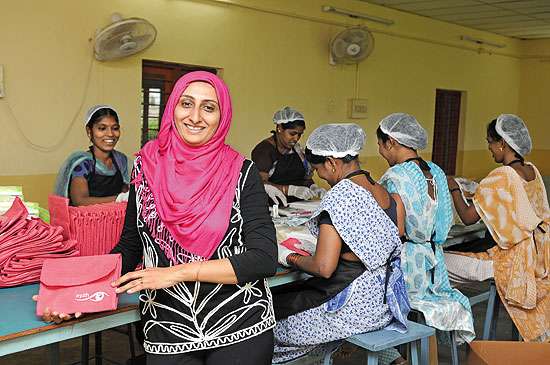
With low-cost birthing kits, Ayzh holds out hope for rural women
- Started 2009
- Location Chennai
- Initial investment Rs 14.5 lakh
- Social impact Savings lives of rural and underprivileged women during childbirth
***
For Zubaida Bai, like most people, statistics meant little more than numbers. Until she nearly became one herself. A serious and prolonged infection during the birth of her first child jolted her into thinking about the risk millions of women face worldwide and not just in India, and what she could do about it. A May 2012 fact sheet by World Health Organisation (WHO) estimated that around 800 women were dying every day from preventable causes and complications related to pregnancy and childbirth, and 99% of these occur in developing countries. In fact, two-thirds of women in Indian villages give birth at home without the help of skilled attendants.
Zubaida seeks to stem this shameful statistic with a simple solution to reduce infections that lead to fatalities during childbirth. Janma, a $2-birthing kit overseas and Rs 150 in India, contains simple essential tools recommended by WHO to provide sanitation and sterility at the time of childbirth. The idea behind Janma is that every woman should have a safe, clean, and hygienic delivery, whether she delivers at home, at a primary health care centre or in a hospital. The size of a paperback, this life-saving kit contains a sterile birthing sheet, a blood absorbing under-pad, a chord clamp, a surgical blade, a bar of soap/ sanitiser, wipes and gloves and basic medication. All this comes in an eco-friendly jute bag that the mother can later use as a purse. The kit comes from Ayzh (pronounced as ‘eyes’), a social venture that the 32-year-old engineer-entrepreneur founded in 2009, to provide health and livelihood solutions to underprivileged women.
Growing up in a middle class household in Chennai, Zubaida saw from close quarters the social and economic hardships women face in India. “I saw my mother struggling financially. Several of my friends were married very early and couldn’t pursue higher education because of lack of funds,” she says. Zubaida was more fortunate, though. After her engineering degree from Chennai, she went on to do her MS (product development and design) from the Dalama University in Sweden on a full scholarship. At 24, she married Habib Anwar and moved to Canada for some time. When the information technology firm he worked for wanted to set up operations in India, Habib jumped at the prospect, and they relocated to Chennai. Upon their return, Zubaida joined Rural Innovations Network, where she worked on product innovation, assisting individuals and organisations to make their product ideas commercially viable.
After four years, she found herself getting increasingly frustrated with the fact that genuinely good products weren’t able to succeed in the market. Habib, too, was tired of corporate life, and decided to join her. With Zubaida’s background in product innovation and her exposure to various projects, and Habib’s financial expertise, they decided to reach out to rural communities. “I have always wanted to find a way to give back to women, especially rural women, who have so little to call of their own,” says Zubaida.
Habib echoes her sentiments, adding, “I had similar experiences when I was growing up and have often been amazed at the hardships my mother had to put up with.” Around that time, a chance meeting with a professor in Boston during a conference they were attending, led them both to do an MBA in Social and Sustainable Enterprises from the Colorado State University in Fort Collins. “Since I managed to get a full scholarship first, I got to do the MBA first,” laughs Zubaida. In 2009, they first registered Ayzh in the US.
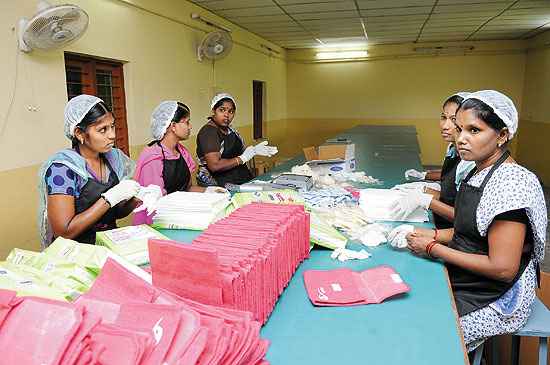
Baby steps
On a field trip to south India while pursuing her MBA, Zubaida contracted an infection due to unsanitary conditions during the delivery of her first child, and spent a year recovering from it. This led Habib and Zubaida to consider maternal health as an area of focus. They spoke extensively with maternal health professionals, and researched the market for products that catered to this segment. The crude methods being used in rural India for childbirth were hardly up to the required safety and hygiene standards. “There was this one place in Rajasthan, where Zubaida was aghast at seeing Topaz blades being used [to cut the umbilical cord],” recalls Habib. The only safe alternatives were branded and expensive products. Janma was born from these deliberations, with a simple business plan to make it work.
Returning to India in 2010, their first step was to register Ayzh in India as well, and launch it with a working capital of around Rs 14.5 lakh. “It was a combination of the prize money we won for Janma at various business plan competitions in the US, and our meagre savings. We even had to pawn some of Zubaida’s jewellery,” says Habib. To start with, Ayzh partnered with the panchayat of Kuthambakkam, a small village in the outskirts of Chennai, training three of its women to assemble the birthing kits. Janma was thus born.
The first order of 100 kits came from Mediscon Hospital, a private hospital catering to the slum population in Bengaluru. “They are still one of our big customers,” points out Habib. Ayzh pitched Janma at every meet of maternal health champions, and targeted NGOs and private sector hospitals catering to the rural and urban poor, and patients from lower middle class groups. They also reached out to government-run institutions, initially. But with limited resources — a small budget and just the two of them doing everything — the couple could sell only 8,000 kits in 2011.
The same year, Zubaida was selected for the Ashoka Foundation’s Young Champion for Maternal Health fellowship. This opened up new doors for Ayzh globally and in India. She met Catherine Hall of the US-based The Birthing Project, who took Janma to Ghana, Uganda and Malawi in Africa. The fellowship also cast a spotlight on Ayzh and in 2012, it received funding from undisclosed social impact institutional investors, who also serve on Ayzh’s advisory board.
Ayzh markets Janma to the institutional sector only. It has two types of customers: medical institutions such as hospital pharmacies, healthcare centres and rural clinics; and non-profit aid organisations that work on women and child health-related issues in developing countries. Its focus is on private hospitals serving low to middle income groups. These, according to Zubaida, deliver 70% of primary healthcare in rural areas. It also reaches out to non-proprietary public enterprises, and non-profits such as the Karuna Trust.
In India, Janma is made available in all four southern states, in addition to Arunachal Pradesh and Mumbai. It also has a large market in Nigeria, Tanzania, Ghana, Malawi and Uganda in Africa, where the company sells almost as many units as it does in India. Janma is sold online by Path, a US-based non-profit that operates in India as well. Ayzh has sold about 20,000 Janma kits till date and the numbers are adding up fast, with 13,000 units sold in the first quarter of CY13. “We expect to add another 50,000 to this number by the end of this year,” says Zubaida, without revealing current revenue numbers. “We expect to break even in another two years,” adds Habib. Ayzh is seeking an additional $800,000 in a second round of start-up funding, to expand its product line, sales team and sustain operations until it achieves breakeven by 2015.
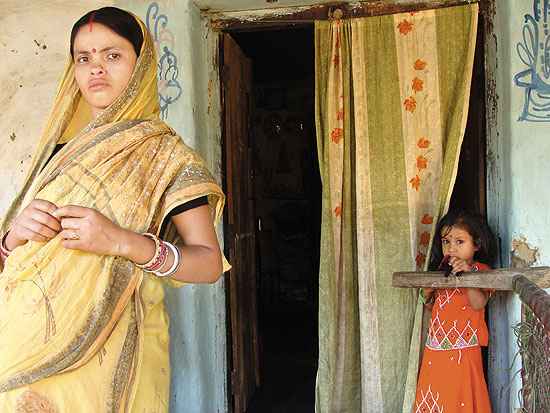
Growing up
Ayzh is staffed by a handful of people and continues to run a tight ship. The number of women assembling Janma has gone up, though only to 12. “There is no money to hire anyone,” laughs Habib, who handles finance and accounts, while Zubaida is in charge of marketing. She’s aided by a marketing manager in India, and one in the US, targeting American charities and UN-related procurement agencies. Ayzh relies on word-of-mouth publicity for Janma. Both Habib and Zubaida say that they make it a point to be present at all major forums where maternal health and mortality are the key issues.
To keep overheads low, Ayzh makes and supplies Janma kits to order. Raw materials are sourced from local pharmaceutical companies. Habib explains that at current volumes, a dedicated assembling unit does not make sense. Surprisingly, Ayzh has not moved to patent Janma. “We feel it’s pointless; any determined person can make a copy of the birthing kit,” says Zubaida.
The key to Ayzh’s success lies in innovating regularly, admits Zubaida: “When you have a really small budget, you learn to be creative.” For instance, while conceptualising Janma, the eco-friendly jute bag was just an afterthought, but it’s now in great demand. “It has become a gift for the mothers,” says Zubaida. Consequently, she invests considerable time and resources on product development. It’s a three-stage process starting with identification of a need through field visits, working on a prototype, and sharing it with potential customers for feedback. The final product is designed by a professional design firm. Ayzh currently works with the US-based Catapult Design, and several other individual designers.
For 2014, it is looking to increase volumes by penetrating north India and offshore production to expand its reach overseas. After the response to Janma in Africa, Ayzh is also exploring options of setting up base there. Consultations are on with government and tax experts on the feasibility of setting up a similar manufacturing model in a country in east Africa. Zubaida is also putting the finishing touches to her next social landmark product Shishu — a new born-care kit, due for launch in the beginning of 2014. Thanks to her, the statistics could tell a very different story now.
source: http://www.business.outlookindia.com / Outlook Business / Home> Enterprise / by S Sen / August 31st, 2013
Neyveli Lignite Corporation enrols 4,219 contract workers in Indcoserve
Cuddalore :
Neyveli Lignite Corporation (NLC) has enrolled 4,219 contract workers into the industrial cooperative service society (Indcoserve) after a gap of 16 years facilitating the process of regularising their services in a phased manner. The corporation until 1996, had enrolled more than 5,000 contract workers and regularised the services of more than 4,000 of them in a phased manner as and when vacancies arose.
It might be recalled that the Supreme Court in April this year upheld a Madras High Court order directing the corporation to evolve a common seniority list of the workers enrolled through Indcoserve and workers enrolled through private contractors while regularising their services. The corporation too submitted a petition to the court conveying that it had evolved a common seniority list of more than 4,000-odd workers following which the court disposed the case paving the way for the regularisation process.![]()
In July this year, more than 25,000 regular and contract workers went on an indefinite strike to protest against the Union government’s decision to disinvest 5% of the shares of the corporation. The workers called off the strike on July 15 after the Centre accepted Tamil Nadu chief minister J Jayalalithaa’s proposal to buy the stakes through the state public sector undertakings.
source: http://www.articles.timesofindia.indiatimes.com / The Times of India / Home> City> Chennai> Seniority List / TNN / September 03rd, 2013
ISMGA urges state govt to take immediate measures to set up ISM university in Tamil Nadu
The Indian siddha medical graduates association (ISMGA) in Tamil Nadu has urged Tamil Nadu chief minister J Jayalalitha to initiate immediate measures to establish an Indian System of Medicine (ISM) university in Tamil Nadu, which has been pending for quite some time due to the apathetic attitude of the officials in the directorate of Indian medicine.
Alleging that the inordinate delay is due to the apathy of the officers, the ISMGA has recently approached the chief minister and submitted a memorandum, demanding immediate measures to speed up the activities for establishing the university.
The Tamil Nadu government had issued an order on January 23, 2012, directing the Directorate of Indian Medicine for taking preliminary action to establish the university. The order had also wanted the directorate to create a post of special officer along with certain temporary posts for the initial work.
The siddha medical graduates association in its memorandum alleged that the concerned officers in the directorate of ISM have so far not taken any positive step towards implementing the government order. The siddha graduates have also alleged that there is deliberate attempt from some corners to block the establishment of the ISM university in the state, hence they sought the intervention of the state chief minister.
ISMGA general secretary Dr Selvin Innocent Das told Pharmabiz that, on behalf of the association, he sent several letters to the directorate of Indian medicine asking for the progress of the order. But, he said, the officers at the directorate are not responding to his queries in this regard. Even his letter through RTI was also unanswered, he told Pharmabiz.
“It is more than 18 months since the government issued the order directing the authorities of the Indian medicines to take steps to establish the ISM university in the state, which is a long cherished desire and a demand of the siddha community. But the concerned officers are not showing any interest, even not replying to our letters. Still we are not sure whether a Special Officer has been appointed for the purpose as ordered by the government. Finally we wanted to approach the government for its immediate intervention,” he said.
The order of the government says that besides appointing a special officer and other temporary staffs, the directorate can utilize the facility at the Tamil Nadu Medicinal Plant Corporation Ltd (TAMPCOL) office at Annanagar as the office of the university for the time being to start the preliminary work. The government had sanctioned more than Rs. 1 crore for the initial work for the university.
The association complains that if the work is not started before long, it will lead to the lapse of the sanctioned amount. They demand that an experienced siddha physician should be appointed as the special officer rather than appointing any academician.
According to them, there are health universities in Kerala, Gujarat, Rajasthan, Himachal Pradesh and in some other states. Since Tamil Nadu is the hub of Siddha system, it is high time an exclusive university for siddha and other Indian systems is established, they added.
source: http://www.pharmabiz.com / PharmaBiz.com / Home> / Top News> Alternative Medicine / by Peethaambaran Kunnathoor, Chennai / Wednesday – September 11th, 2013
Buffalo meat could help India stay No.1 in beef export this year too
Shipments may rise to 1.7 million tonnes
Chennai :
India will continue to be the leading beef exporter this year despite slower growth in cattle, calf production and higher domestic consumption.
In the Indian context, beef export is shipment of buffalo meat which is also known as carabeef in the global market. Shipment of cow meat from the country is banned.
Last year, India overtook Brazil as the top exporter of beef, mainly due to growing acceptance of its buffalo meat by South-East Asia, West Asia and African countries.
Buffalo meat exports this year from India could rise to 1.7 million tonnes (mt) against 1.41 mt last year.
Initially, the USDA has estimated that beef exports this year could top 2.1 mt.
“Our buffalo meat exports are giving a tough competition to other countries due to our competitive pricing and quality,” said Tarun Bajaj, General Manager (Livestock products), Agricultural and Processed Foods Export Development Authority (Apeda).
Buffalo makes up one-third of the bovine population in the country.
It is preferred to cow due to its adaptability to climatic conditions and high milk fat content as dairy production is fuelling the bovine sector.
Since slaughter of cow is banned, beef production is driven by buffalo slaughter which is allowed.
However, the slaughter is restricted to males and unproductive females.
According to Apeda, exports of meat and its products increased to $3.29 billion in 2012-13 against $2.91 billion the previous year.
Since 2008, when India exported 672,000 tonnes, shipments of buffalo meat have almost trebled.
BRAZIL’S EXPORTS
Indian exports have made inroads into West Asia, North Africa and South-East Asia, a key market for Brazil, as buffalo meat is cheaper in these price-sensitive markets.
It is produced according to halal standards (meat prepared as prescribed by Islamic law).
Brazil has been witnessing a constant decline in beef exports due to shrinking land availability, but this year its shipments are expected to rise to 1.6 mt from 1.52 mt last year.
Currently, there is renewed interest in livestock farming as the Brazil Government is providing support for pasture management and genetic improvement of cattle.
“The other reason for our exports rising is our quality. Some of our exporters have excellent processing units. This is really helping,” said Bajaj.
DOMESTIC MARKET
On the other hand, domestic consumption is also likely to increase this year. It could increase to 2.1 mt from 2.04 mt last year. Since 2008, domestic consumption has not gained as much as exports.
This is because people are shifting to lamb and other meats in view of increasing income in the country. Poultry meat, in particular, has increased sharply in the last few years.
According to the USDA, cattle heads could increase by four million tonnes to 327 mt, while nearly 64.3 mt calf could be produced this year against 63.4 mt last year.
The USDA also projected a lower export of 8.6 mt this year.
source: http://www.thehindubusinessline.com / Business Line / Home> Industry> Agri-Biz / by M. R. Subramanai subramani.mancombu@thehindu.co.in / Chennai – June 12th, 2013
Book bank scheme opens doors of knowledge to more students
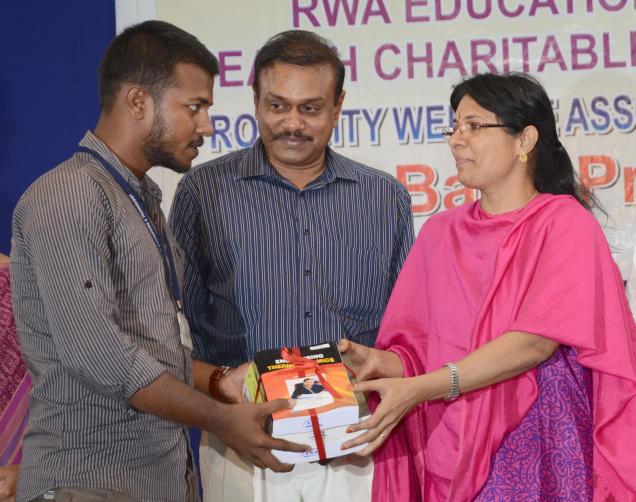
The book bank scheme being implemented by Rockcity Welfare Association saw an expansion of its services on Saturday with extension of the scheme to the students of engineering colleges.
The scheme introduced in 1998 has been catering to the book needs of under-graduate courses and this is the first time it has spread its roots to professional courses, courtesy allocation of Rs. Three lakh by P. Kumar, MP, from his MP Local Area Development Scheme.
A total of 100 students from five engineering colleges in and around Tiruchi got the books in the first batch today. This apart, the book bank has benefited 18,500 students till now.
Jayashree Muralidharan, District Collector, inaugurated the extended scheme and handed over the sets of books to the engineering college students. She advised the students to develop a positive attitude to emerge successful in their life. They should not be discouraged while facing any failures.
The Collector gave away cash prizes and certificates to the beneficiaries of book bank, who had secured highest marks in their academic performance. She also gave away ‘Sri Brijmohan Choudhari Memorial Rolling Trophy’ to Chidambaram Pillai College for Women. K. Sekar, principal, and Loganathan, secretary of the college, received the same.
Ashok Gandhi, project chairman, explained the objective of the scheme, which benefited students belonging to economically weaker sections. Inder Choushari, president of the association, Inderchand Lall, secretary, Saravanan, public prosecutor, offered felicitations.
source: http://www.thehindu.com / The Hindu / Home> News> Cities> Tiruchirapalli / by Special Correspondent / Tiruchi – September 15th, 2013
Seven prominent persons honoured with Doyens of Madras award
Chennai :
Seven prominent persons, including chairwoman of the Adyar Cancer Institute V Shanta and former vice-chancellor of Anna University E Balaguruswamy, were honoured with the ‘Doyens of Madras’ award by the Ambassador group of hotels on Thursday.
Chairman emeritus of Sankara Nethralaya S S Badrinath, former chief election commissioner T S Krishnamurthy, cricketer Kris Srikanth, IOB chairman M Narendra and Sundaram Fastners Ltd. CMD Suresh Krishna are the others who received the award instituted as part of the Madras Day celebrations.![]()
“I am what I am due to the Cancer Institute. Every award I receive is for the institute as well,” said Shanta, after receiving the award. “There is a misconception that the quality of the service by a non-profit organisation is poor, but the Cancer Institute has always been there to bring smile to those who are suffering.”
Geoff Magee, vice-president operations of the Ambassador Group, said, “The event is not just part of our group’s corporate social responsibility, but because we wanted to celebrate Madras Day celebrations along with the city.”
source: http://www.articles.timesofindia.indiatimes.com / The Times of India / Home> City> Chennai> Persons / by Saradha Mohan Kumar, TNN / August 29th, 2013
They serve an appetising meal for economic independence
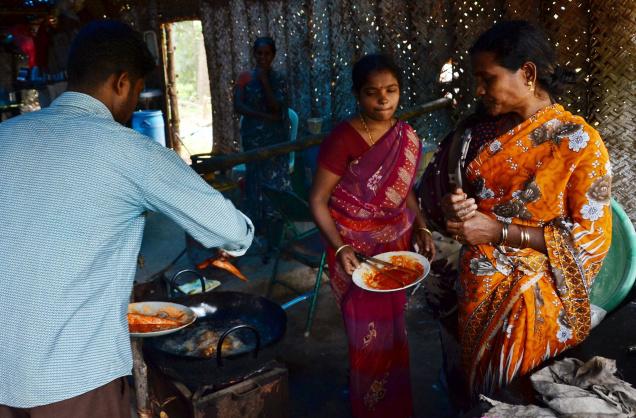
Kaani tribal women’s small eatery near Papanasam dam has food aficionados raving
After enjoying a delicious lunch at a roadside eatery under a thatched shed near Papanasam dam in a salubrious climate, one of the customers, wife of a leading hotelier here, asked the woman serving the food to give her packed ‘meen kuzhambu’ (fish curry) sufficient for three servings.
Within a couple of minutes, mouth-watering hot fish curry with a few pieces of fish is packed in a hot-pack and handed over to the customer even as a few more tourists await to get the curry packed after enjoying their lunch.
This has become an everyday affair at the small eatery ever since the Kaani Tribal women self-help group started this business venture 15 months ago with the help of Kalakkad–Mundanthurai Tiger Reserve (KMTR) administration. They serve lip-smacking quality lunch at a nominal price but with limited resources.
Though they have to purchase everything – right from salt to LPG cylinder – from the market either at Ambasamudram or Vickramasingapuram and transport it to their eatery close to one of the prime reservoirs of the district, the rightly priced food items with excellent quality attract a decent crowd everyday and helps to revitalise the lives of two dozen Kaani Tribal women and their families.
This success story has not been realised overnight. The long and sustained efforts put in by a few dedicated officers of the KMTR, especially C.Gurusamy, Deputy Director of KMTR’s Mundanthurai Division, have transformed the lives of these women.
Though the KMTR officials were ready to arrange financial assistance for setting up the eatery, the Kaani Tribal women, the actual beneficiaries, were not prepared for such a business venture as they were not used to it.
“Even in these modern days, the Kaani women don’t interact freely with outsiders, which is essential for successfully running a hotel. So we had to persuade them,” says Jebaz, Ranger of Mundanthurai Range.
Though constant persuasion helped a lot in mentally preparing the women for the business venture, it was the unusual method applied by the forest officials that ultimately yielded results.
“Even though their food is very simple, the Kaani women make it in a delicious manner. So some of us occasionally had lunch in their houses and used to laud their skill in preparing yummy food. We repeatedly asked them to showcase their culinary skill to the tourists visiting Mundanthurai and Papanasam dam, while getting attractive revenue out of it, and this finally encouraged them to test their luck in the venture,” recalls Mr.Jebaz.
Since there is no power in the eatery, the Kaani women prepare the ‘masala’ for the fish curry, fish fry, side dishes, sambar, rasam, etc., manually by using grinding stones, and this is another reason for the special taste which attracts crowds.
While the unlimited fish curry meal is priced at Rs.50, the price of fish fry varies from Rs.10 to Rs.30 depending upon the size. “You can’t get fish fry for this price anywhere in this region,” says V.Valsala, one of the Kaani women running the eatery. As long as the Kaani women were cultivating lemon, jackfruit, banana, etc., in their small farms, the revenue they got was very little.
“After the forest officials encouraged us (Kaani women) to form a women self-help group, they motivated us to start the eatery, which has become a success story now as we have been getting a decent revenue for the past 15 months and this has ensured our economic independence,” proudly says Ms.Valsala.
source: http://www.thehindu.com / The Hindu / Home> News> Cities> Madurai / by P. Sudhakar / Tirunelveli – May 31st, 2013
I’m too competitive to date a racer, says Alisha Abdullah
Alisha Abdullah is still smarting from the disappointment she suffered in the National Rotax Max Karting Championship held in Hyderabad last year. She finished number seven in a track filled with male racers.
“All the guys on the track overtook me last time. I am very egoistic and determined to win it this time around and get my own back. I have a professional racing team backing me as well,” affirms the 23-year-old speed junkie who is touted to be India’s first ever woman superbike racer with records in car, kart and bike racing. She will be competing for the title in the city this weekend.![]()
Alisha is presently honing her skills on the Rotax Max go karts, considered to be one of the fastest go-karts in the world. These 30 bph-powered, 125 cc two stroke engines hit speeds in excess of 100 km per hour.
“In every lap, the drivers need to hit 120 km/ph consistently. If you drop the speed even a little, you’ll see 8-10 competitors zoom past you in a matter of seconds,” says Alisha adding, “To be zipping past at such high speeds a couple of feet above the ground is a pretty exhilarating experience.
If you hit the curve, you break your ribs for sure!” This diminutive racer began go-karting from the time she was eight years old and was winning races from when she was 11.
She won the national go-karting championship at 13 and claimed the best Novice Award in the open class of Formula car racing as well. Her tryst with bikes began when she was 15. Her dad RA Abdullah, a former national bike champion, has been instrumental in initiating her into the fast lane.
“My dad gifted me a 600 cc superbike on my 18th birthday and told me you are going to race. As excited as I was, it was huge 240 kg machine and I was like, ‘Are you are kidding me?’ He wasn’t.
My dad took me to Singapore and got me my first racing suit and taught me all the skills. I struggled initially, but soon I got better and began winning,” recalls the Chennai girl, who switched to racing cars three years ago.
However, Alisha still trains with her bike “even if it is just to show off” her custom made racing suit. Alisha will get on to her superbike to take part in an unprecedented all-woman superbike race to be held in Spain in October this year. “It’s a huge event. Woman bikers from all over the world will be taking part in this first-of-its-kind race.
All the racers will be training for a few weeks before the race kicks off,” shares Alisha, who’s also got a couple of other big races to look forward to this year.
Next week Alisha will be racing in the National Racing Championship (Saloon Class) to be held in Coimbatore. “I will also be racing in the Formula BMW series as well later this year,” adds Alisha, who will be the lone Indian in the circuit there as well.
She is often the lone girl on the track too. This pint sized racer admits to “hate losing to men,” who admittedly never lose an opportunity to remind her of being the only girl on the race track.
“I love to tickle the male ego and know exactly how to deal with them. I might look small but can give any man a run for his money in the fitness stakes,” she declares.
At a recent national fitness camp held for racers in Coimbatore she outdid all the boys clocking 69 push ups a minute!
“When zooming past the track at speeds in excess of 200 kilometers an hour, you experience G-force and unless you are extremely fit, it’s hard to maintain focus.
I am a fitness fanatic and train religiously for five hours every single day,” shares Alisha, who is proud of her four pack abs and her toned, athletic body.
So, has she found love on the track too? Alisha retorts, “I would never date a fellow racer. I am too competitive for that and would hate to date a racer. I can’t think of doing anything other than beating them on the race track!”
source: http://www.articles.timesofindia.indiatimes.com / The Times of India / Home> Sports> Racing> Racer / by Karthik Pasupulate, TNN / July 14th, 2013
